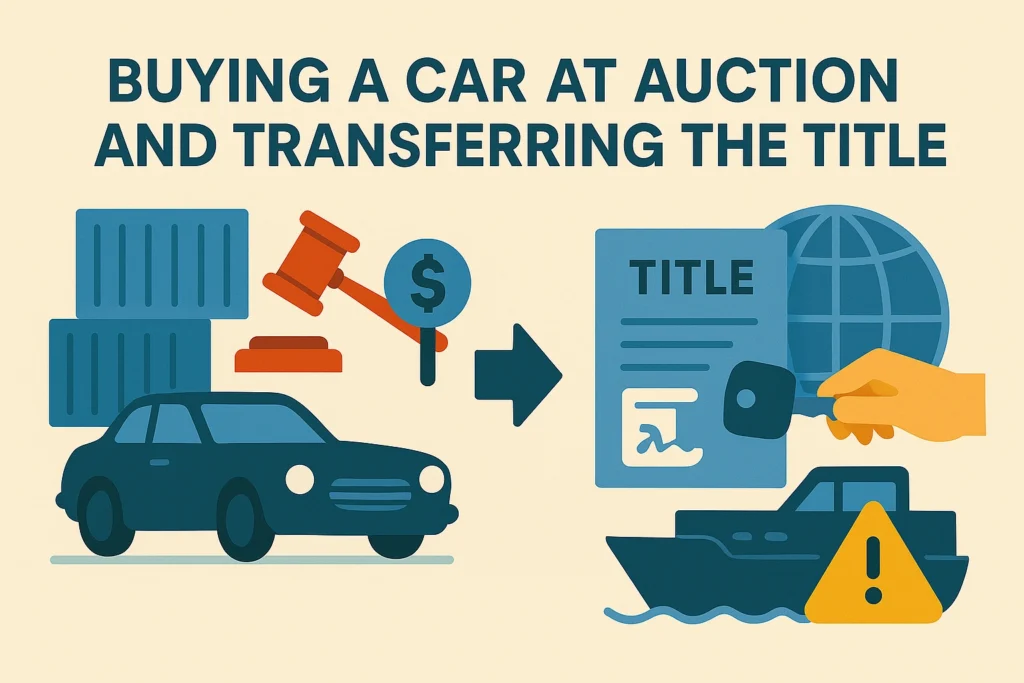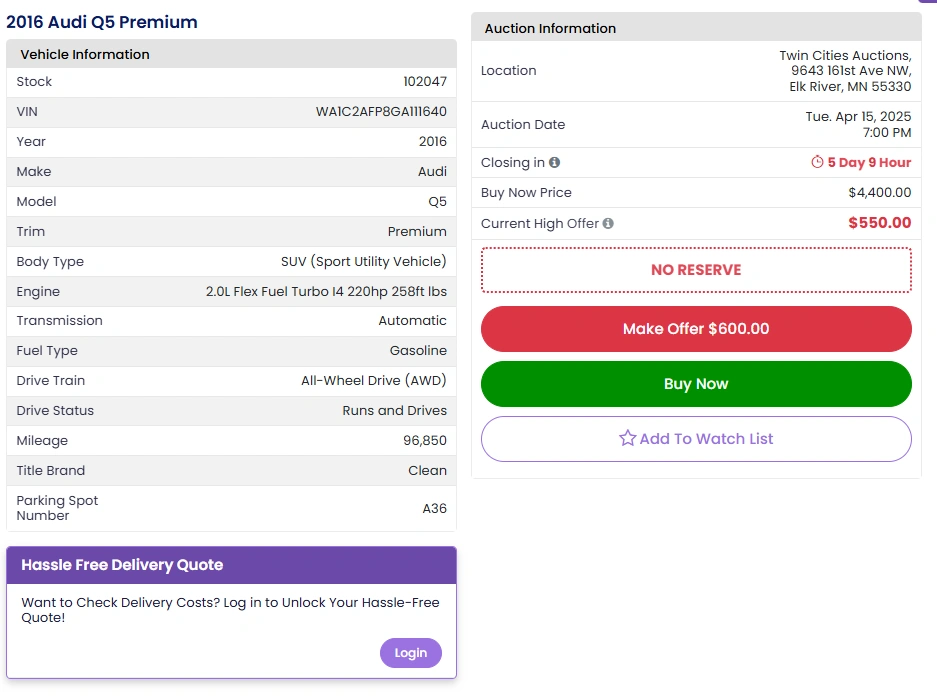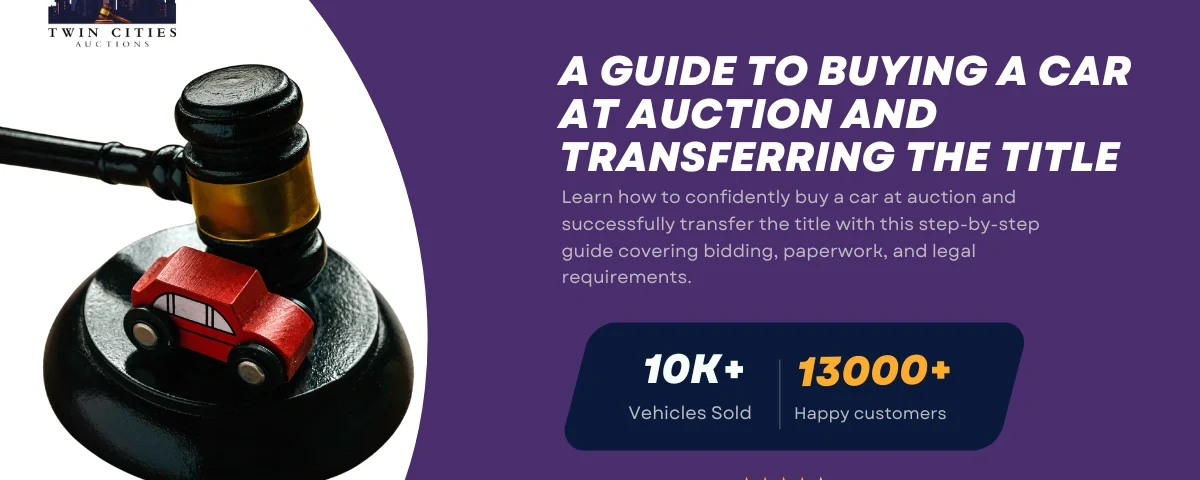The National Auto Auction Association estimates that member auctions moved nearly 7.6 million vehicles in 2024, converting well over half the cars that crossed the block.
One busy Saturday sale can supply enough inventory to fill a midsize dealer’s lot for a year. Yet every winning bid is only half the story: you do not truly own the car until the title is in your name—and that step trips up many first-time bidders. This guide walks you from registration to ride-home with a legally transferred title in your glove box.

Key Takeaways
- Preview, research, and budget before you raise a paddle
- Pay auction fees fast or risk storage and relist charges
- Title type dictates inspection and insurance rules
- State DMVs reject unsigned or incomplete titles
- Twin Cities Auctions streamlines paperwork and keeps buyer fees low
How Car Auctions Work
Public auctions come in two flavors. In-lane sales happen on site; bidders inspect cars during a preview window, then compete as each lot crosses the block. Online simulcast or timed-bid sales stream the lane in real time or list vehicles for countdown bidding.
To participate you must:
- Create an account and show government photo ID
- Place a small registration deposit or credit-card hold
- Accept buyer fee schedules that add a flat amount or percentage to the hammer price
- Follow preview rules (no engine starts without staff approval, no test-drives)
Most houses require cleared funds by the close of business the next working day. Fail to pay and the car is relisted—often with a stiff penalty.
Pre-Auction Checklist
- Financing or cash ready – temporary floor-plan line, wire funds, or cashier’s check
- Market research – study recent auction comps for realistic bid targets
- VIN decoding and history report – flag salvage brands or odometer rollbacks early
- Inspection day tools – flashlight, paint-meter, OBD scanner, tire-depth gauge
- Budget buffer – plan at least ten percent above the bid for fees and surprise fixes
Bidding Strategy and Etiquette
- Set a walk-away number before the car rolls up
- Raise the paddle with confidence; timid bids invite rapid outbids
- Watch the ringman’s hand signals to anticipate increment jumps
- Avoid “auction fever” — missing one deal is cheaper than overpaying by thousands
- Confirm you’re the high bidder with the clerk to avoid mix-ups
Winning the Bid: Payment and Gate Pass
When the hammer falls a Buyer’s Order prints with lot number, price, and fees. Head to the pay window:
- Settle by wire, debit card, or cashier’s check
- Collect the gate pass required to remove the vehicle
- Sign the odometer disclosure if the car is under ten model years
- Note the pickup deadline; storage charges start the next business day
Transferring the Title From Auction to Bidder
1. Title Checked In
The seller surrenders the original title when the car arrives. An auction clerk verifies the VIN, brand status, and any lien release, then locks the document in a secure file.
2. Hammer Falls, Paperwork Triggers
Your Buyer’s Order alerts the title department to start the reassignment.
3. Clerk Reassigns the Title
- The clerk fills in the reassignment block with your legal name (or dealership name), address, purchase date, and exact mileage.
- You countersign the odometer statement; the auction stamps its dealer number beside the signatures.
4. Payment Must Clear
Titles remain “on hold” until funds post. Wires clear the same day, cashier’s checks the next business day, and credit-card transactions sometimes require one extra verification step.
5. Title Released or Mailed
- Instant-title auctions hand you the reassigned title at the pay window.
- Title-absent or delayed-title auctions overnight the paperwork once funds clear—industry standards allow up to 30 days, though most buyers receive titles within ten business days.
6. Inspect Immediately
Confirm spelling, VIN, mileage, and that any lien release is attached. Report errors within 48 hours so the clerk can reissue documents quickly.
7. File at Your DMV
Bring the reassigned title, bill of sale, insurance proof, and any inspection forms to your DMV within your state’s deadline (ten days in California, fifteen in Arizona, forty-five in Colorado). Pay taxes and fees, and receive plates or a temp tag.
Pro Tips
| Issue | How to Prevent Delays |
| Title mailed to old address | Verify shipping address on the Buyer’s Order before you pay |
| Unsigned odometer block | Ask the clerk to review signatures while you’re present |
| Lien still listed | Require a notarized lien-release letter before bidding |
| “Title Absent” warning | Bid only if you can wait 30–45 days for paperwork |
Title Types You Might See
State DMVs brand titles to flag past damage or ownership issues.
| Title Type | Meaning | Road-Legal Now? | Typical Next Step |
| Clean | No negative brands | Yes | Register normally |
| Salvage | Declared total loss | No | Repair then inspect |
| Rebuilt | Salvage repaired and inspected | Yes | Insure and register |
| Lien | Lender holds interest | Yes (with lender OK) | Pay off or get lien release |
How to Transfer the Title in Your State
Requirements differ, but every DMV expects complete signatures, fees, and deadlines. Three examples:
| State | Unique Requirement | Deadline |
| California | Transfer within ten days plus smog if required | 10 days |
| Arizona | Emissions form in Phoenix/Tucson metros | 15 days |
| Colorado | Out-of-state VIN inspection form DR 2698 | 45 days |
General Steps
- Confirm seller and buyer signatures match ID exactly
- Complete odometer and purchase-price boxes
- Provide insurance proof if required at transfer
- Pay title, registration, and local tax
- Keep digital scans or paper copies for your records
Common Title Transfer Pitfalls and How to Avoid Them
- Unsigned blocks — double-check before leaving the counter
- Missing lien release — never rely on promises; get the notarized letter
- Altered odometer entries — any scratch-outs void the title; request a duplicate instead
- “Title Absent” surprises — read run-list notes and ask the clerk for status
- Missed DMV deadlines — late filing triggers penalties or even impound
Why Auctions Are a Smart Choice for Car Purchases
Auctions can be an excellent source for late-model vehicles with clear chains of title and affordable pricing. Twin Cities Auctions, based in Minnesota, is one such reputable auction house that offers a wide range of vehicles at competitive prices.
Key Benefits of Buying from Auctions:
- Wide Selection: Auctions like Twin Cities Auctions offer a variety of vehicles, from low-budget cars to high-end models.

- Competitive Pricing: Auctions often offer vehicles at prices below retail value, enabling dealers to maximize their profit margins.

- Transparency: Auctions provide full vehicle history reports, so you know exactly what you’re buying.

- Convenient Bidding: Many auctions offer online bidding for your convenience, making it easier to source vehicles without being physically present.
Twin Cities Auctions: A Smart Vehicle Sourcing Choice
For those in the automotive industry, Twin Cities Auctions offers an excellent platform for sourcing quality vehicles at competitive prices.
Whether you are just starting or expanding your business, this auction house provides transparency, competitive pricing, and a broad selection.
| Feature | Description |
| Inventory Variety | Wide range of cars, trucks, and SUVs available |
| Competitive Pricing | Below-market pricing allows for higher profit margins |
| Vehicle History Reports | Detailed history reports for every vehicle |
| Online Bidding | Convenient online bidding options for dealers |
| Financing Options | Financing available to help with inventory purchases |
Conclusion
Buying at auction can chop thousands off retail prices, but only if the paperwork is perfect. From research and bidding to the DMV stamp, each step protects your wallet and your legal right to drive. Master the process now and every future auction win will feel like a dealer delivery.
Twin Cities Auctions: No Dealer License? No Problem!
Are you interested in buying or selling a car but worried about the complexities of needing a dealer license? Worry no more! At Twin Cities Auctions, we’ve removed the barriers, making our auctions open to everyone.
Whether you’re a seasoned buyer or a first-time seller, our platform offers a welcoming environment where you can participate freely. Experience the ease and excitement of our next auction and discover just how simple and rewarding a car auction can be!
Looking for more options? Explore our comprehensive list of all available car auctions across the United States. Your next deal might be just a click away!
FAQ
What taxes do I pay when I title an auction car?
Sales or use tax goes to your home state at transfer, based on your county’s rate.
Can I drive the car home on the gate pass?
Some states issue a temporary transit permit at the auction; others require towing until the title transfer is complete.
What is a bonded title?
When paperwork is missing, many states allow a surety bond equal to 1.5 times the car’s value. After a set period (often three years) the bond expires and a regular title is issued.
Do I need a dealer license to bid?
Public auctions like Twin Cities Auctions welcome individual buyers with a government photo ID. Dealer-only lanes still require a license.
Can I return a car if I find undisclosed issues?
Most auctions sell vehicles as-is. Arbitration policies allow limited returns for major undisclosed problems discovered within a short window, usually one business day.
Source Links
https://www.autoremarketing.com/ar/wholesale/naaa-members-sell-nearly-7-6m-vehicles-in-2024/
https://azdot.gov/mvd/services/vehicle-services/title-and-registration/out-state-vehicles
https://www.acvauctions.com/blog/how-to-transfer-a-car-title
https://bluenotary.us/title-transfer-vs-registration
https://bluenotary.us/copart-title-transfer
https://bluenotary.us/title-transfer-vs-registration
https://www.acvauctions.com/blog/how-to-transfer-a-car-title


